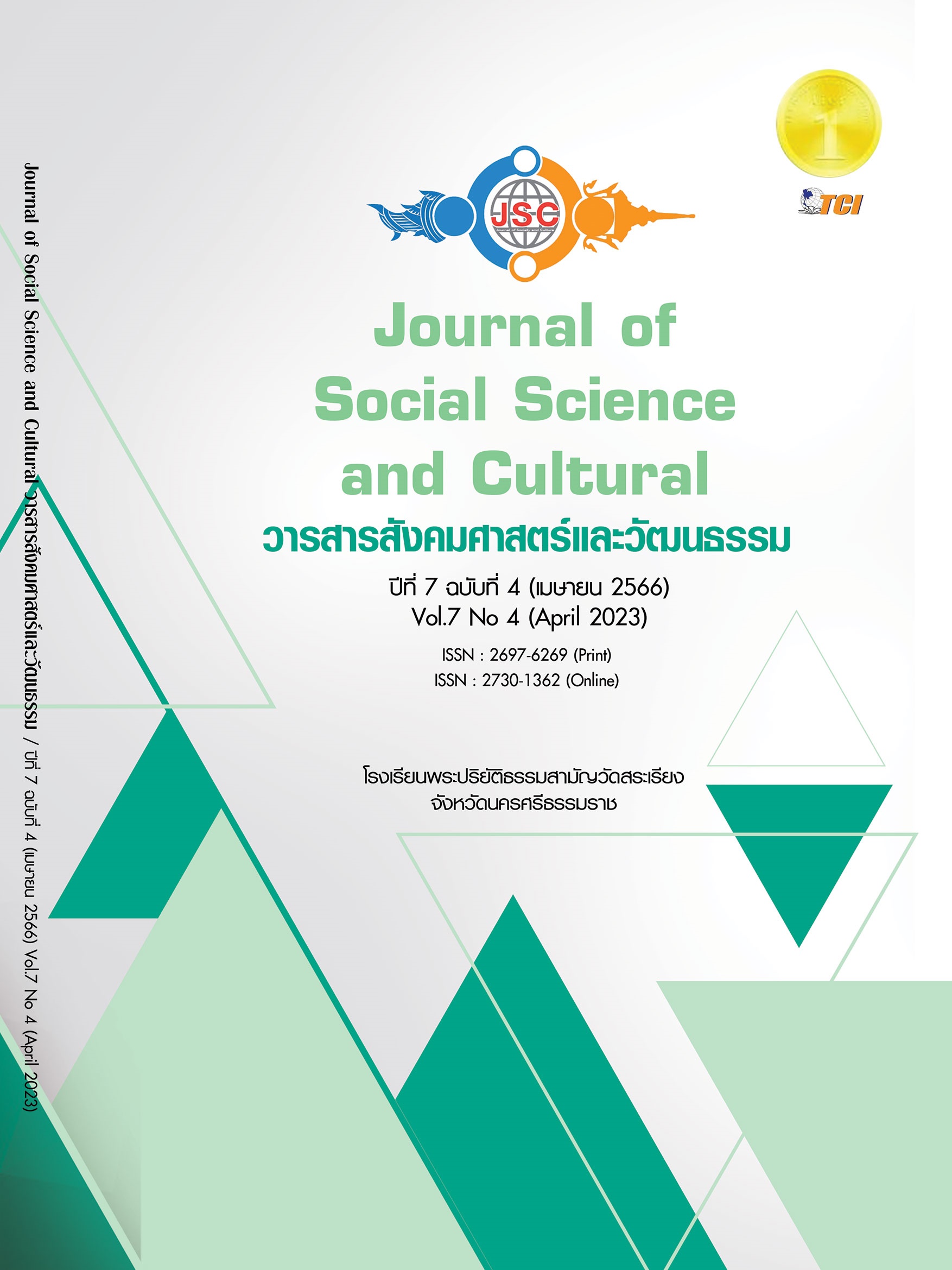THE COMPONENTS OF THE DIGITAL LEARNING ECOSYSTEM ABOUT CULTURAL HERITAGE MODEL IN ORDER TO ENHANCE DIGITAL SKILLS, LIFELONG LEARNING SKILLS AND FUTURE LABER SKILLS
Main Article Content
Abstract
Digital technology plays an increasingly important role in learning for people of all ages. This research aims to 1) design components of the digital learning ecosystem model for cultural heritage that enhances digital skills, lifelong learning skills, and future workforce skills, and 2) assess the appropriateness of the components of the digital learning ecosystem model for cultural heritage. This research combines both qualitative and quantitative approaches. The first sample group consisted of 3 experts in cultural heritage learning management and digital learning management, and the second sample group was the population in the old city of Nakhon Si Thammarat municipal area of all ages, including community leaders, school-age population/teenagers, working-age population, and the elderly. The second sample size was 50 and they were gathered using a specific method. The research tools consisted of an interview form and a suitability assessment form. Statistics used were content analysis and Kaiser-Meyer-Olkin (KMO). The research results found that the digital learning ecosystem model for cultural heritage consists of 4 main components: 1) cultural heritage database system, 2) online lessons, 3) cultural heritage museum, and 4) gamification for cultural heritage learning. The components of the digital learning ecosystem model for cultural heritage have a component weight in the range of 0.488 to 0.891. The research also found a new element of using social networks to promote learning and linking knowledge from the web, which is a fundamental factor in the digital age. It can be concluded the studied components can be used to develop a digital learning ecosystem for cultural heritage to service people of all ages.
Article Details
References
กฤตย์ษุพัช สารนอก และคณะ. (2562). องค์ประกอบและสถาปัตยกรรมระบบของระบบนิเวศการเรียนรู้ดิจิทัลเพื่อการจัดการเรียนการสอนด้วยการเล่าเรื่องแบบดิจิทัลสำหรับนักศึกษาวิชาชีพครู. สิกขา วารสารศึกษาศาสตร์, 6(2), 87-100.
ณฐภัทร ติณเวส และฐาปนีย์ ธรรมเมธา. (2559). การศึกษารูปแบบการจัดการศึกษาออนไลน์ระบบเปิดแบบ MOOC ของอุดมศึกษาไทย. Veridian E-Journal มหาวิทยาลัยศิลปากรณ์, 9(3), 1463-1479.
ดาริกา มณีฉาย และคณะ. (2563). การพัฒนาเว็บแอพพลิเคชันบนฐานคิดการออกแบบเกมเพื่อยกระดับผลสัมฤทธิ์และแรงจูงใจทางการเรียน ระดับมัธยมศึกษา. วารสารวิชาการการจัดการเทคโนโลยี มหาวิทยาลัยราชภัฏมหาสารคาม, 7(2), 95-105.
พลอยพรรณ จิตราช. (2560). การพัฒนารูปแบบพิพิธภัณฑ์ไดโนเสาร์แบบเสมือนจริง โดยใช้การผสานเทคนิคภาพเสมือนจริง. ใน วิทยานิพนธ์วิทยาศาสตรมหาบัณฑิต สาขาสื่อนฤมิต คณะวิทยาการสารสนเทศ. มหาวิทยาลัยมหาสารคาม.
ศักรินทร์ ชนประชา. (2562). การศึกษาตลอดชีวิต. วารสาร AL-NUR บัณฑิตวิทยาลัย มหาวิทยาลัยฟาฏอนี, 26(1), 159-175.
ศาลากลางจังหวัดนครศรีธรรมราช. (2564). ข้อมูลสถิติเกี่ยวกับประชากรจังหวัดนครศรีธรรมราช. เรียกใช้เมื่อ 24 พฤษภาคม 2565 จาก http://www. nakhonsith ammarat.go.th
สำนักงานเทศบาลนครนครศรีธรรมราช. (2564). เกี่ยวกับเทศบาล. เรียกใช้เมื่อ 24 พฤษภาคม 2565 จาก https://www.nakhoncity.org/aboutnakhoncity.php
สำนักงานส่งเสริมเศรษฐกิจดิจิทัล. (2563). แผนส่งเสริมการพัฒนาเมืองอัจฉริยะ. เรียกใช้เมื่อ 22 พฤษภาคม 2565 จาก https://www. depa.or.th /th/smart-city-plan
สิโรดม มณีแฮด และปณิตา วรรณพิรุณ. (2563). ระบบนิเวศการเรียนรู้ดิจิทัลด้วยปัญญาประดิษฐ์สำหรับการเรียนรู้อย่างชาญฉลาด. วารสารศึกษาศาสตร์ มหาวิทยาลัยนเรศวร, 21(2), 359-373.
Neittaanmaki, P. et al. (2016). The Components of a Digital Age Learning Ecosystem. Jyvaskyla: Learning Platforms.
UNESCO Institute for Lifelong Learning. (2022). Transforming higher education institutions into lifelong learning institutions. Retrieved May 10, 2022, from https://uil.unesco.org


